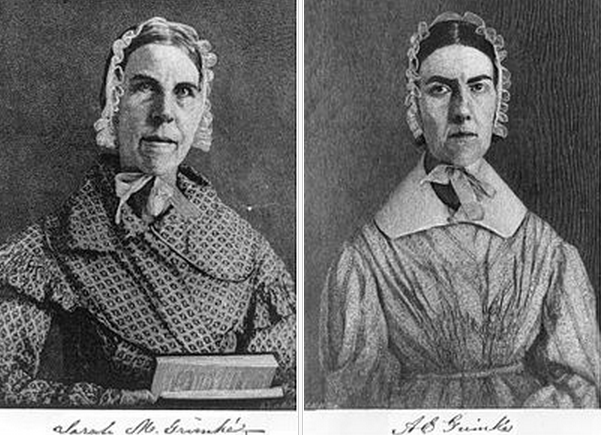Reasonable people can disagree on whether there’s a 21st century “war on women,” and if so what roles forces such as the GOP, the Christian Right and mass media have played in it. But if we take the historical view, there’s no denying that mainstream American society has consistently attacked activist women, those who dared to push beyond the traditional views or definitions of their era and work for something alternative and better.
Take the Grimké sisters, for example. Born to a prominent South Carolina family, Angelina and Sarah Grimké became two of the 19th century’s most committed activists: for women’s rights, as in Sarah’s Letters on the Equality of the Sexes and the Condition of Women (1838); for the abolition of slavery, as in Angelina’s Appeal to the Christian Women of the South (1836); and for other social causes and reforms. They were consistently condemned and vilified for those efforts, most especially for speaking in public and to “promiscuous” (i.e. mixed-gender) audiences. At one such event, at an 1838 anti-slavery convention in Philadelphia, Angelina spoke for more than an hour while stones and other objects were hurled against the windows and walls by a hostile mob—a mob that returned the next day and set fire to the convention hall.
Hostility toward abolitionists was, of course, interconnected with attacks on public women in that particular case, although the broader critiques of their public speaking efforts focused entirely on the Grimkés’ gender. But there were no such mitigating factors in the late 19th and early 20th century attacks on women’s suffrage activists. When thousands of suffrage activists marched to the White House to protest Woodrow Wilson’s March 1913 inauguration (scheduled for the next day), they were cursed, spit upon and even physically attacked by hostile crowds. Even when they weren’t being physically assaulted, suffrage activists were consistently belittled and demonized in media and cultural texts, such as the 1910 children’s book Ten Little Suffergets, which depicted the activists as silly little girls fortunately dissuaded from their cause by everything from cake and a “DEAD dolly” to drowning and a whipping.
Such longstanding historical attacks, physical as well as cultural, provide an important context for the late 20th century “backlash” against feminism identified by Susan Faludi and other scholars, as well as for our contemporary debates over birth control, wage equality and other issues. But along with the overt attacks, it’s important to consider another ongoing side of these American histories: the effects they had and continue to have on talented and innovative women in all walks of life. Illustrating those effects is the frustrating story of Sophia Hayden Bennett, the first woman to graduate from MIT with a degree in architecture and the architect chosen (only three years later, at the age of 23) to design the Women’s Building at the 1893 World’s Columbian Exposition in Chicago. Despite this honor, Hayden Bennett’s design was criticized for “revealing the limitations” of its creator’s gender; the American Architect and Building News went further in its review, arguing that “as a woman’s work it ‘goes’ of course … it is simply weak and commonplace … The roof garden is a hen-coop for petticoated hens, old and young.”
Fed up with such responses, and likely extremely limited in her opportunities, Hayden Bennett never designed another building, and retired from architecture less than two years after the Exposition. When we see men follow Hillary Clinton around during her 2008 presidential campaign with signs ordering her to “iron their shirts,” witness the bullying and threats directed at female video game designers and scholars in the ongoing Gamergate controversy, it’s important to ask whether these longstanding histories and changed—and how many other talented American women might be forced out of their chosen professions and public activisms. As we begin this Women’s History Month, I can think of few historical and contemporary questions still worth asking.
Lead photo: Sarah and Angelina Grimké via Wikimedia Commons
Ben Railton is an Associate Professor of English at Fitchburg State University and a member of the Scholars Strategy Network.







Whatever the thinking of “reasonable people,” whoever they are, after race, hating women is and has long been a a centerpiece of American politics, supported by its economic workings and religious culture.
“After race”? After? Really?
In the American history butcher shop a lot of good meat has been left on the floor…
History’s lost and forgotten women, like M. Louise McLaughlin, would make a great running feature.
As a white male I hate to admit it but white males have been and still are some really shitty excuses for humanity.
While that’s definitely been true far too often, it’s worth noting that these attacks could come from fellow women as well (Hayden Bennett’s Exposition designs were consistently attacked by the much more traditional/conservation organizing committee, which was all-female). I see this more as a broad, mainstream societal issue, and one against which we can all push back as a result.
Thanks,
Ben